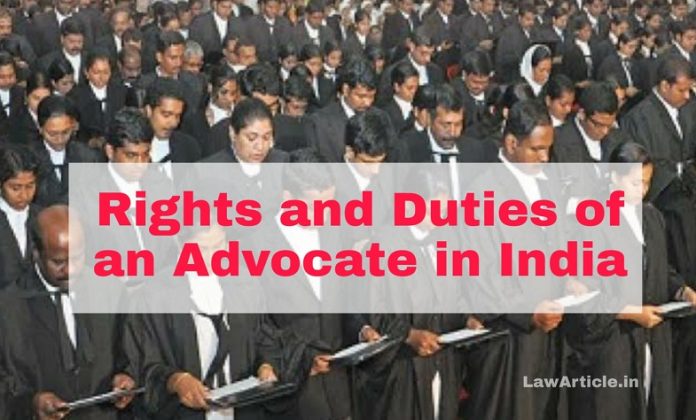Advocates are officers of the court, they are expected to assist the court in the administration of justice. Advocates collect material related to the case and thus assist the court in making the correct decision. A lawyer is a partner with the judiciary in the administration of justice.
A lawyer is an expert in the field of law. The law governing the advocates was given by the Advocates Act, 1961 by Ashok Kumar Sen. The Advocates Act, 1961 is governed and implemented by the Bar Council of India. The Bar Council of India is the main administrative body for the management of law and order and stability in India.
Each state in India has its own bar council, whose role is to register advocates willing to advocate within a particular state or territory. A lawyer’s registration with a state bar council does not limit him to practice in that particular state or territory. Originally, the State Bar Council has the role of dividing the workload of the Bar Council of India. The State Bar Council could deal with local issues in a comfortable manner.
Right of Practice:
In the context of the legal profession, ‘Right of practice’ refers to a special right given to advocates to practice law before courts and tribunals. The right to practice is protected at two levels and they are as follows:
- General Protection: Under Article 19 (1) (g) of the Indian Constitution protects individuals the right to exercise their choice.
- Specific protection: Section 30 of the Advocates Act, 1961 states that a nominee in the State Bar Council has the right to practice before any court or tribunal in India, including the Supreme Court.
Duties of an Advocate towards Client:
- It is the duty of an advocate to serve a client. If the advocate wishes to withdraw from the case, he shall give a valid reason for withdrawing from the case and sufficient notice to the client. He will refund a portion of the fee earned from the customer.
- It is the duty of a lawyer not to accept a case where he will appear as a witness. Similarly, if the lawyer has the knowledge to appear as a witness during the events, he should not proceed in the case.
- It is important that the lawyer make full and clear disclosure of the parties and be interested in the case.
- To provide the best legal advice to the best of your ability.
- Maintaining confidentiality and not disclosing the client’s personal details.
- Handing over the client’s money account and providing a copy whenever necessary.
- To keep the client updated on any changes or issues.
- After the removal of the case, the matter of the opposite party should not be raised in the same case.
Duties of an Advocate towards the court:
- Maintaining a respectful attitude towards the courts and the legal system.
- A lawyer will conduct himself with dignity and self-respect.
- A lawyer must dress in a prescribed form before appearing in court.
- An advocate may not wear a band or gown in public except on such formal occasions and in such places as may be prescribed in the Bar Council of India or the Court.
- It is the duty to not influence the decision of the court by any unlawful or improper means and to free the court’s judgment from effect.
- A lawyer shall not act or plead in any matter in which he is himself interested. For example, (i) he will not act in an insolvency petition even if he himself becomes insolvent. (ii) He should not accept the brief of a company of which he is a director.
- An advocate shall not be certified as to any bail or bail for his client for the purpose of any legal proceeding.
The above provision enables an advocate to act independently and fearlessly in the course of his duty as petitioner to his client. He has the duty and authority to present his complaint against a judicial officer to the appropriate authority. Further, he has to assist the courts in discharging the proper provision of justice by not affecting the decision of the court in illegal and improper ways. He will not have any private communication with the judge regarding pending cases in the court.




